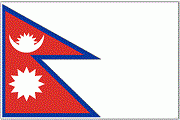Statement by Mr. Krishna Aryal, First Secretary at the Permanenet Mission of Nepal to the United Nations, during the High-level meeting of the General Assembly to commemorate the twentieth anniversary of the adoption of the Durban Declaration and Program of Action
Wednesday, 22 September 2021
Round-table-II: Reparation, racial justice and equality for people of African descent- how to address the past to move forward
(15:00-17:00 PM)
Mr. Chairman,
Honourable Ministers,
Excellencies, Distinguished Delegates
It is a privilege to be part of this historic meeting marking the 20th anniversary of the adoption of the Durban Declaration and Programme of Action.
Durban Declaration and Programme of Action is a blueprint for action to prevent and combat racism and racial discrimination in all its manifestations.
Despite some progress since it was adopted two decades ago, instances of racism, intolerance and xenophobia have increased in intensity and severity in recent times.
The COVID-19 pandemic has aggravated the existing situation even more.
Today is the occasion to demonstrate greater political will and commitment for the correction of historical wrongs perpetrated against the people of African descent.
Mr. Chairman,
Acceptance of past wrongdoing and making sure such an egregious state of human suffering would not happen in future are key to the reparation.
Healing the racial trauma through respecting and embracing diversity, equity and inclusion is the gateway to social cohesion.
Ensuring full integration into political, economic and social life with a participation in decision-making level is a fundamental requirement to equality.
The formal apology, reparation and forgiveness not only soothe the wounds of the people of African descent but that also reflect the higher plane of human civilization and wisdom.
Mr. Chairman,
Nepal’s engagement to the United Nations Special Committee against Apartheid, for more than three decades, is a testimony of our solidarity with the people of Africa in their struggle against racism in general and fight against Apartheid in South Africa in particular.
The Constitution of Nepal is founded on the core values of equality and non-discrimination. Any discrimination based on caste, race, region, religion is punishable by law.
Nepal is a State Party to seven core human rights Conventions including the CERD.
The fight against racism and discrimination must continue until we achieve full and substantive equality.
In conclusion, Mr. Chairman, it is important to take a comprehensive multi-stakeholder approach to eliminate all forms of racism, racial discrimination, xenophobia and related intolerance through legal reforms, empowerment programs, and social protection to the racially discriminated community.
I thank you for your kind attention!


